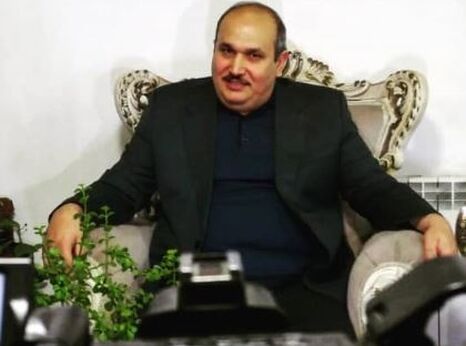Activist's sentence increased to 15 years

Abbas Lesani has spent decades advocating for the rights of the Azerbaijani Turkic ethnic minority and has been arrested numerous times as a result. His previous arrests have stemmed from peaceful activities such as publishing a calendar in the Azerbaijani Turkic language, and taking part in Azerbaijani Turkic cultural gatherings on International Mother Language Day and ceremonies commemorating several Azerbaijani Turks who were killed during protests in May 2006 when security forces used excessive force, including teargas and live ammunition, to disperse protests. He has faced several unfair trials and subsequent convictions on national security related charges in relation to his activism.
Abbas Lesani’s was arrested on 15 January 2019 by plain clothes ministry of intelligence agents while he was in Branch 2 of the Revolutionary Court in Tabriz, East Azerbaijan province, after being summoned there in connection to charges related to his activism. Following his arrest, his family repeatedly visited prosecution offices, Revolutionary Courts, police stations, prisons and other known detention centres in Tabriz, East Azerbaijan province, and Ardabil, Ardabil province, travelling hundreds of kilometres to enquire about him, but the authorities refused to provide them with information. Six weeks after his arrest, his family learned from the office of the prosecutor in Ardabil that he was being held in a detention centre in Ardabil but the family was denied contact with him for a further two weeks when he was allowed a visit with his wife in the presence of security officials. The authorities subjected his wife to interrogations during this visit.
Abbas Lesani’s trial, which was held before Branch 1 of the Revolutionary Court in Ardabil between 10 June and 27 June 2019 was grossly unfair. He was denied access to a lawyer until after the investigative stage of his case was complete, meaning that he was repeatedly interrogated without legal representation. In a verdict reviewed by Amnesty International, the court cited as “evidence” peaceful activities that are protected under the rights to freedom of expression, association and assembly in international human rights law. They included: holding meetings in his home and attending cultural gatherings; speaking about the history of the Azerbaijani Turkic ethnic minority community in Iran, including on the protests that took place in 2006; and speaking to media organizations outside Iran. The court verdict also accused him of communicating with GAMAC (Turkish acronym for South Azerbaijan National Liberation Front), which is a group based outside Iran that posts global and regional news stories online, and of establishing a group inside Iran, which Abbas Lesani has consistently denied. The court verdict refers to Abbas Lesani’s human rights work as “so-called civil activism” and cites speeches, interviews and discussions as evidence of national security offences, including his alleged association with GAMAC. On 26 September 2019, Branch 1 of the Court of Appeal in Ardabil province increased his sentence from eight years to 15 years.
Under international law, fair trial rights must be respected during appeals, as they are part of the criminal proceedings. Fair trial rights include the right to adequate time and facilities to prepare the appeal, the right to counsel, and the right to a hearing before a competent, independent and impartial tribunal. The higher court which hears the review must be a competent, independent and impartial court. The impartiality of the appeals tribunal is undermined if it involves a judge who participated in the case as a prosecutor before the lower court, as in the case of Abbas Lesani.
In recent weeks, other Azerbaijani Turkic activists have been arrested after taking part in protests and some remain in detention facing trumped up national security related charges, including “insulting the Supreme Leader” and “disrupting public order”. Among those arrested were Ali Khairjoo, Asgar Akbarzadeh, Meysam Jolani, Mohammad Jolani, Morteza Parvin, Mostafa Parvin and Sajjad Jolani, who is severely visually impaired. Amnesty International learned that security forces beat Sajjad Jolani and several other activists during arrest. The activists were among dozens of people arrested from the Azerbaijani Turkic ethnic minority when they took part in protests in the provinces of Ardabil, East Azerbaijan and West Azerbaijan between the end of September and beginning of October 2020. The protests were in support of Azerbaijan in the fighting that erupted in late September between Azerbaijan and Armenia and against the Iranian authorities’ alleged support of Armenia in the conflict.